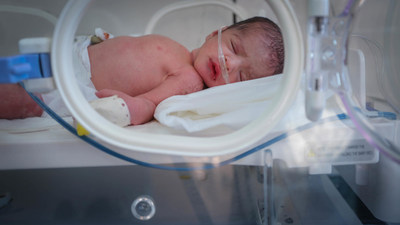One woman and six newborns die every two hours from complications during pregnancy or childbirth in Yemen - UNICEF
NEW YORK, AMMAN, Jordan and SANA'A, Yemen, June 14, 2019 /CNW/ - One woman and six newborns die every two hours in Yemen from complications during pregnancy or childbirth, UNICEF said today in the first of a series of short snapshots on maternal and newborn health in Yemen.

"Bringing life into the world in Yemen can all too often turn into a tragedy for entire families," said UNICEF Executive Director Henrietta Fore. "Decades of underdevelopment and years of intense fighting have left essential public services, including crucial healthcare for mothers and babies, on the brink of total collapse."
The Childbirth and parenting in a war zone series, released this week, also notes that the maternal mortality rate has risen sharply since the escalation of the conflict, from five maternal deaths a day in 2013 to 12 maternal deaths a day in 2018.
Additional findings include:
- 1 out of every 260 women dies in pregnancy or childbirth;
- Only 3 out of 10 births take place in health facilities;
- 1 in 37 newborn babies die in the first month of life;
- 1 in 15 adolescent girls between the age of 15 and 19 has given birth;
- 1.1 million pregnant and breastfeeding women need treatment for severe acute malnutrition.
Access to quality ante- and post-natal health services is key to newborn and maternal survival. In the absence of adequate services, and because of lack of access and unaffordable transport costs, community health workers are fast becoming 'providers of last resort' for women and children ? especially in remote, rural and war-affected areas. However, they too face challenges such as insecurity and the lack of supplies and transport.
Half of all health facilities in Yemen are not functional due to staff shortages, lack of supplies, inability to meet operational costs or limited access. Those still running face severe shortages in medicine, equipment and staff, putting lives at risk.
Working with partners on the ground, UNICEF is supporting community-based service delivery and primary healthcare facilities, with a focus on continuous care before and during the pregnancy, around the time of birth and after birth for both mother and baby.
At the community level, UNICEF and partners also support community midwives and health volunteers to provide case management of common childhood illnesses and home-based maternal and newborn care.
UNICEF is calling on all parties to the conflict and the international community to:
- Focus resources on the poor, marginalized and internally displaced communities.
- Protect the health care system in the country, with specific attention to primary healthcare.
- Resume salary payments for health sector workers and support incentives for staff involved in delivering lifesaving services.
- Sustain and scale up social health protection schemes such as cash transfers for vulnerable families and health vouchers.
"Antenatal care and skilled health attendance at delivery are essential to the survival of both mothers and babies," said Fore. "As the world marks the 30th anniversary of the Convention on the Rights of the Child, we renew our call for all children ? in Yemen and elsewhere ? to enjoy their full rights to health, education, protection and peace."
About UNICEF
UNICEF is the world's leading humanitarian organization focused on children. We work in the most challenging areas to provide protection, healthcare and immunizations, education, safe water and sanitation and nutrition. As part of the United Nations, our unrivaled reach spans more than 190 countries and territories, ensuring we are on the ground to help the most disadvantaged children. While part of the UN system, UNICEF relies entirely on voluntary donations to finance our live-saving work. Please visit unicef.ca and follow us on Twitter, Facebook and Instagram.
SOURCE UNICEF Canada
News published on and distributed by:



